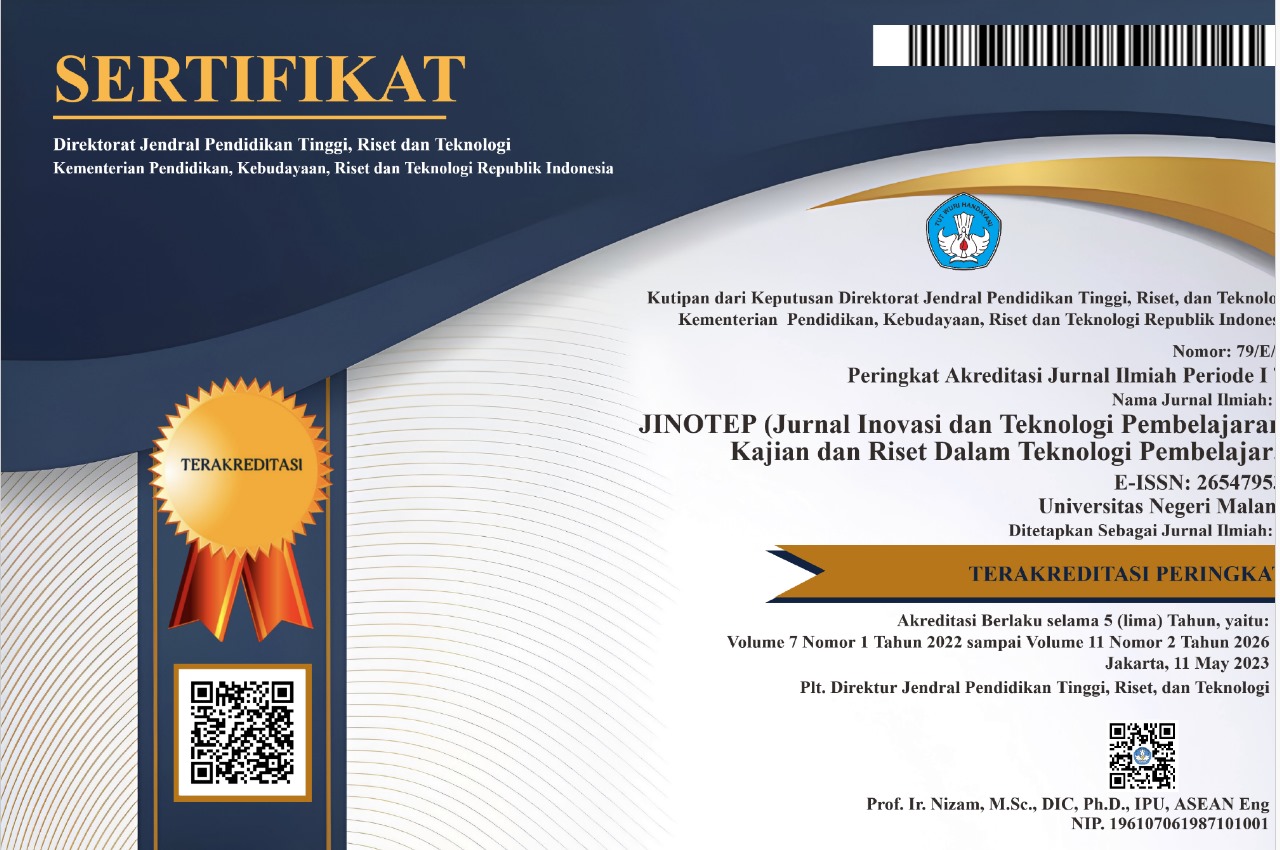Innovation of communication strategy on the learning process
Abstract
Abstrak: Pada tahun 2020, dunia diramaikan oleh fenomena wabah virus corona atau Coronavirus Disease 2019 (Covid-19). Hal ini menyebabkan berbagai sektor mengalami perubahan, salah satunya pada bidang pendidikan yang menunjukkan penurunan. Hal ini menjadi peluang guru untuk memperbaiki kualitas pendidikan yang telah menurun. Oleh karena itu, guru diharapkan dapat menentukan bagaimana strategi komunikasi yang efisien dalam proses pembelajaran untuk meningkatkan efektivitas pendidikan. Tujuan dari penulisan ini adalah untuk mengetahui strategi komunikasi guru SDN Percobaan 4 Wates dalam proses pembelajaran. Metode penelitian yang digunakan adalah deskriptif kualitatif dengan data yang diperoleh dari hasil observasi serta wawancara dengan guru SD Negeri Percobaan 4 Kulon Progo serta dokumentasi buku-buku penunjang penelitian dan bahan lainnya yang sesuai dengan kajian penelitian. Hasil dari penelitian ini adalah guru menggunakan strategi kurikulum khusus yang lebih ringan, menggunakan PowerPoint, dan menggunakan teknik ice-breaking agar dapat meningkatkan daya konsentrasi siswa. Dengan hasil penelitian ini, diharapkan pengajar maupun pembaca dengan bidang yang sama untuk dapat menentukan bagaimana strategi komunikasi yang sesuai agar pembelajaran dapat berjalan dengan komunikasi yang efisien.
Abstract: In 2020, the world was enlivened by the coronavirus outbreak or Coronavirus Disease 2019 (Covid-19) phenomenon. This causes various sectors to experience changes, one of which is in the education sector, which shows a decline. This is an opportunity for teachers to improve the quality of education that has declined. Therefore, teachers are expected to be able to determine how efficient communication strategies are in the learning process to increase educational effectiveness. The purpose of this writing is to find out the communication strategies of SD N Percobaan 4 Wates teachers in the learning process. The research method used is descriptive qualitative, with data obtained from observations and interviews with SD Negeri Percobaan 4 Wates teachers and documentation of research supporting books and other materials by research studies. The results of this study reveal that teachers used a lighter specific curriculum strategy, PowerPoint, and ice-breaking techniques to increase students' concentration power. With the results of this research, it is hoped that teachers or readers in the same field will be able to determine the appropriate communication strategy so that learning can proceed with efficient communication.
Keywords
Full Text:
PDFReferences
Abdullah, M. (2019). School culture to serve performance of madrasah in indonesia. Qudus International Journal of Islamic Studies, 7(1), 71–100. https://doi.org/10.21043/qijis.v7i1.4572
Allen, J., Rowan, L., & Singh, P. (2020). Teaching and teacher education in the time of COVID-19. Asia-Pacific Journal of Teacher Education, 48(3), 233–236. https://doi.org/10.1080/1359866X.2020.1752051
Azukas, M. E., & Kluk, J. R. (2022). Simulated teaching: An exploration of virtual classroom simulation for pre-service teachers during the covid-19 pandemic. Educational Communications and Technology: Issues and Innovations, 6, 57–65. https://doi.org/10.1007/978-3-030-99634-5_6#DOI
Basirat, M., & Taghizadeh, M. (2021). Online teacher roles and competencies: voices from preservice EFL teachers. The Journal of English Language Pedagogy and Practice, 15(3), 70–95. https://doi.org/10.30495/JAL.2022.696544
Camayang, J. G., & Bautista, R. G. (2022). Teaching in the midst of the pandemic: Insights and perspectives from the lenses of the pre-service teachers. International Journal of Evaluation and Reasearch in Education, 11(4), 1664–1672. https://doi.org/10.11591/ijere.v11i4.23016
Damanik, J. F. F., Hutasoit, R. D., & Sitorus, L. D. (2022). Writing teaching strategies by junior high school english teacher. Jurnal Ilmiah Wahana Pendidikan, 8(1). https://doi.org/10.5281/zenodo.5889540
Doungwilai, D., & Kanjug, I. (2023). A learning model promoting higher-order thinking skills and active citizenship with global mindedness. International Journal of Evaluation and Reasearch in Education, 12(2), 886-892. https://doi.org/10.11591/ijere.v12i2.24218
Farwati, D. Z., Rahmah, M., & Sutisna, E. (2019). The application of ice breaking activities in teaching english to junior high school students. Journal of English Teaching and Linguistic Studies, 1(1), 16-26. https://doi.org/10.55215/jetli.v1i1.1489
Fynn, A. (2022). Academic burnout among open distance e-learning students during the COVID-19 pandemic. Perspectives in Education, 40(4), 70–88. http://dx.doi.org/10.38140/pie.v40i4.6298
Gufron, M. (2016). Komunikasi Pendidikan. Kalimedia.
Herrera, L. J. P. (2018). ESOL urban high school teachers’ perceptions of their instructional strengths and challenges: A qualitative case study. Dialogues: An Interdesciplinary Journal of Languange Teaching and Research, 2(1), 1–21. https://doi.org/10.30617/2.1.2
Ijudin, Wakila, Y. F., & Anton. (2022). Implementing active learning to increase student’s learning interest in islamic religious education. Jurnal Pendidikan Islam, 8(1), 51–62. https://doi.org/10.15575/jpi.v8i1.17437
Jumiati, Gani, S. A., & Sari, D. F. S. (2017). Communication strategies used by the english teacher in teaching speaking skill. Research in English and Education, 2(4), 53–62. https://doi.org/10.31539/leea.v3i2.1016
Kalman, M., Kalender, B., & Cesur, B. (2022). Teacher learning and professional development during the covid-19 pandemic: A descriptive study. Educational Research: Theory and Practice, 33(2), 1–22.
Ma’arif, M. A., Rofiq, M. H., & Sirojuddin, A. (2022). Implementing learning strategies for moderate islamic religious education in islamic higher education. Jurnal Pendidikan Islam, 7(1), 75–86. https://doi.org/10.15575/jpi.v8i1.19037
Michalak, R. (2022). Teachers’ experiences in working with cognitively gifted students. Multidisciplinary Journal of School Education, 11(2), 163-187. https://doi.org/10.35765/mjse.2022.1122.0
Miles, M. B., & Huberman, A. M. (1994). Qualitative Data Analysis: An Expanded Sourcebook (2nd ed.). Sage Publications.
Mousavi, S. M., Amirghassemi, A., & Saeidi, M. (2021). Iranian EFL teachers’ perceptions of burnout sources: A qualitative study. The Journal of English Language Pedagogy and Practice, 15(30), 119–150. https://doi.org/10.30495/JAL.2022.696590
Mufarida, B. (2021). Kualitas pendidikan di 70 negara ini turun gara-gara pandemi covid-19 [Economics]. idxchannel.com. https://www.idxchannel.com/economics/kualitas-pendidikan-di-70-negara-ini-turun-gara-gara-pandemi-covid-19
Pazaer, N., & Assaiqeli, A. (2023). Pre-service teachers’ views on using English comics to improve pupils’ English language skills. Studies in English Languange and Education, 10(1), 197–215. https://doi.org/10.24815/siele.v10i1.21836
Prajana, A. (2017). Pemanfaatan aplikasi whatsapp dalam media pembelajaran di UIN AR-Raniry Banda Aceh. Cyberspace: Jurnal Pendidikan Teknologi Informasi, 1(2), 122–133. http://dx.doi.org/10.22373/cs.v1i2.1980
Rahman, D. S., & Sahayu, W. (2020). How do foreign language teachers motivate students in language learning? Studies in English Languange and Education, 7(1), 181–193. https://doi.org/10.24815/siele.v7i1.15586
Richards, J. C. (2021). Introduction: Online teacher education and professional development in TESOL. Iranian Journal of Languange Teaching Research, 9(3), 1–7. https://doi.org/10.30466/ijltr.2021.121072
Sunarto. (2012). Ice Breaker dalam Pembelajaran Aktif. Yuman Pressindo.
Surahman, B., & Salmon, I. P. P. (2023). School culture and the quality of learning: The experience in Special Region of Yogyakarta. International Journal of Evaluation and Reasearch in Education, 12(2), 692–702. https://doi.org/10.11591/ijere.v12i2.23140
Surahman, E., Sulthoni, & Pratama, U. N. (2021). Online observation protocol to supervise online learning and its sample report. In Proceedings of the 7th International Conference on Education and Technology (ICET 2021). Atlantis Press, 601, 6–12. https://doi.org/10.2991/assehr.k.211126.027
Suyadi. (2013). Strategi Pembelajaran Pendidikan Karakter. PT Remaja Rosdakarya.
Tegowati, Khamimah, W., Mutmainah, D., Syahrenny, N., & Widiarma, I. (2022). Analysis of online learning on students’ understanding and learning motivation with lecturer competence as moderating variable (studies during the covid-19 pandemic). Jurnal Kependidikan, 8(1), 85–93. https://doi.org/10.33394/jk.v8i1.4601
Tholibon, D. A., Nujid, M. M., Mokhtar, H., Rahim, J. A., Rashid, S. S., Saadon, A., Tholibon, D., & Salam, R. (2022). The factors of students’ involvement on student-centered learning method. International Journal of Evaluation and Reasearch in Education, 11(4), 1637–1646. https://doi.org/10.11591/ijere.v11i4.22314
Utami, K., Apriliya, S., & Saputra, E. (2022). The urgency of digital literacy and ethics for parents in educating children in the digital age. Jurnal Kependidikan, 8(1), 58-67. https://doi.org/10.33394/jk.v8i1.4605
Vardhani, N. K., & Tyas, A. S. P. (2018). Strategi komunikasi dalam interaksi dengan mahasiswa pertukaran asing. Jurnal Gama Societa, 2(1), 9–16. http://dx.doi.org/10.22146/jgs.40424
DOI: http://dx.doi.org/10.17977/um031v10i22023p141
Refbacks
- There are currently no refbacks.
Copyright (c) 2023 Raden Zulfi Tsaltsa Kurnia, Akhmad Rifa'i

This work is licensed under a Creative Commons Attribution-ShareAlike 4.0 International License.
======================================================================
Jurnal Inovasi dan Teknologi Pembelajaran published by Universitas Negeri Malang in collaboration with the Asosiasi Program Studi Teknologi Pendidikan Indonesia (APS TPI) and Ikatan Profesi Teknologi Pendidikan Indonesia (IPTPI) with a MoU.
Publisher Address:
Educational Technology Laboratorium, Building D5, 1st Floor
Faculty of Education, Universitas Negeri Malang
Semarang St. No. 5, Malang City, East Java Province, Postal Code 65145
Email: jinotep.fip@um.ac.id
======================================================================

JINOTEP is licensed under a Creative Commons Attribution-ShareAlike 4.0 International License.
JINOTEP Statistics (Since July 13th, 2020)



.png)




.png)
1.png)
1.png)
4.png)
2.png)
1.png)
1.png)
.png)


_3.png)





1.png)
.png)